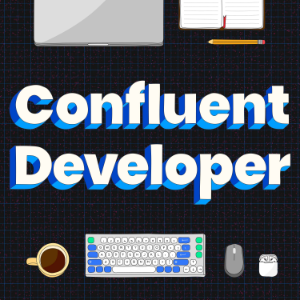
Confluent Developer ft. Tim Berglund, Adi Polak & Viktor Gamov
Technology Podcasts
Hi, we’re Tim Berglund, Adi Polak, and Viktor Gamov and we’re excited to bring you the Confluent Developer podcast (formerly “Streaming Audio.”) Our hand-crafted weekly episodes feature in-depth interviews with our community of software developers (actual human beings - not AI) talking about some of the most interesting challenges they’ve faced in their careers. We aim to explore the conditions that gave rise to each person’s technical hurdles, as well as how their experiences transformed their understanding and approach to building systems.
Whether you’re a seasoned open source data streaming engineer, or just someone who’s interested in learning more about Apache Kafka®, Apache Flink® and real-time data, we hope you’ll appreciate the stories, the discussion, and our effort to bring you a high-quality show worth your time.
Location:
United States
Genres:
Technology Podcasts
Description:
Hi, we’re Tim Berglund, Adi Polak, and Viktor Gamov and we’re excited to bring you the Confluent Developer podcast (formerly “Streaming Audio.”) Our hand-crafted weekly episodes feature in-depth interviews with our community of software developers (actual human beings - not AI) talking about some of the most interesting challenges they’ve faced in their careers. We aim to explore the conditions that gave rise to each person’s technical hurdles, as well as how their experiences transformed their understanding and approach to building systems. Whether you’re a seasoned open source data streaming engineer, or just someone who’s interested in learning more about Apache Kafka®, Apache Flink® and real-time data, we hope you’ll appreciate the stories, the discussion, and our effort to bring you a high-quality show worth your time.
Twitter:
@confluentinc
Language:
English
Website:
https://www.confluent.io/
Adventures in Data Infrastructure with Gwen Shapira | Ep. 11
Duration:00:21:32
Decreasing Java Build Times with Pratik Patel | Ep. 10
Duration:00:25:56
Reimagining Stream Processing with Matthias J. Sax | Ep. 9
Duration:00:36:42
How Time Kills All Deals in Pre-Sales with Rachel Predreschi | Ep. 8
Duration:00:27:40
Scaling AI in Engineering with Peter Bell | Ep. 7
Duration:00:27:16
How Kafka Expert Robin Moffat Tackles Open Source Problems | Ep. 6
Duration:00:24:50
Building Parquet into Apache Pinot ft. Neha Pawar | Ep. 5
Duration:00:26:07
The Fix That Secured 1000s of Credit Cards ft. Brian Sletten | Ep. 4
Duration:00:29:37
How Viktor Gamov Stays Curious as Tech Rapidly Evolves | Ep. 3
Duration:00:30:11
How Tim Berglund Found His Calling | Ep. 2
Duration:00:30:36
Real-time Threat Detection ft. Adi Polak | Ep. 1
Duration:00:32:53
We're back! Welcome to the Confluent Developer Podcast.
Duration:00:01:20
Apache Kafka 3.5 - Kafka Core, Connect, Streams, & Client Updates
Duration:00:11:25
A Special Announcement from Streaming Audio
Duration:00:01:18
How to use Data Contracts for Long-Term Schema Management
Duration:00:57:28
How to use Python with Apache Kafka
Duration:00:31:57
Next-Gen Data Modeling, Integrity, and Governance with YODA
Duration:00:55:55
Migrate Your Kafka Cluster with Minimal Downtime
Duration:01:01:30
Real-Time Data Transformation and Analytics with dbt Labs
Duration:00:43:41
What is the Future of Streaming Data?
Duration:00:41:29